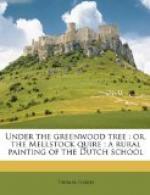“He’ve clinked off home-along, depend upon’t,” another suggested, though not quite believing that he had.
“Dick!” exclaimed the tranter, and his voice rolled sonorously forth among the yews.
He suspended his muscles rigid as stone whilst listening for an answer, and finding he listened in vain, turned to the assemblage.
“The treble man too! Now if he’d been a tenor or counter chap, we might ha’ contrived the rest o’t without en, you see. But for a quire to lose the treble, why, my sonnies, you may so well lose your . . . " The tranter paused, unable to mention an image vast enough for the occasion.
“Your head at once,” suggested Mr. Penny.
The tranter moved a pace, as if it were puerile of people to complete sentences when there were more pressing things to be done.
“Was ever heard such a thing as a young man leaving his work half done and turning tail like this!”
“Never,” replied Bowman, in a tone signifying that he was the last man in the world to wish to withhold the formal finish required of him.
“I hope no fatal tragedy has overtook the lad!” said his grandfather.
“O no,” replied tranter Dewy placidly. “Wonder where he’s put that there fiddle of his. Why that fiddle cost thirty shillings, and good words besides. Somewhere in the damp, without doubt; that instrument will be unglued and spoilt in ten minutes—ten! ay, two.”
“What in the name o’ righteousness can have happened?” said old William, more uneasily. “Perhaps he’s drownded!”
Leaving their lanterns and instruments in the belfry they retraced their steps along the waterside track. “A strapping lad like Dick d’know better than let anything happen onawares,” Reuben remarked. “There’s sure to be some poor little scram reason for’t staring us in the face all the while.” He lowered his voice to a mysterious tone: “Neighbours, have ye noticed any sign of a scornful woman in his head, or suchlike?”
“Not a glimmer of such a body. He’s as clear as water yet.”
“And Dicky said he should never marry,” cried Jimmy, “but live at home always along wi’ mother and we!”
“Ay, ay, my sonny; every lad has said that in his time.”
They had now again reached the precincts of Mr. Shiner’s, but hearing nobody in that direction, one or two went across to the schoolhouse. A light was still burning in the bedroom, and though the blind was down, the window had been slightly opened, as if to admit the distant notes of the carollers to the ears of the occupant of the room.
Opposite the window, leaning motionless against a beech tree, was the lost man, his arms folded, his head thrown back, his eyes fixed upon the illuminated lattice.
“Why, Dick, is that thee? What b’st doing here?”
Dick’s body instantly flew into a more rational attitude, and his head was seen to turn east and west in the gloom, as if endeavouring to discern some proper answer to that question; and at last he said in rather feeble accents—“Nothing, father.”




